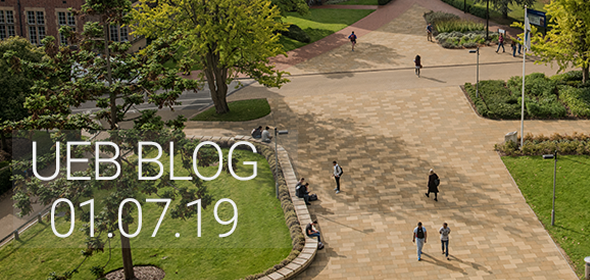Today was the monthly 10-Year Plan UEB meeting, but three ’normal’ UEB papers needed to be discussed first, because they required time-critical consideration.
First, a paper on United Visit Days, which had further developed proposals outlined in an initial concept paper approved in May, aimed at ensuring a better and more consistent applicant experience before and at visit days, while also improving the cost-effectiveness and efficiency of the visit days. UEB approved a changed approach this year, which will see visit days for in-scope subjects* for 2019-20 run on nine selected Wednesdays and Saturdays, delivery of a morning programme of centralised activity to complement the existing academic-driven activities, together with enhanced marketing and communications activity relating to the visit days. The proposed changes this year will not impact the academic-driven part of the visit days, and the project will be further developed in partnership with faculties for future years.
(* after consultation with faculties, the following areas are out of scope for this project because of their particular requirements and timings: Medicine, Health Sciences, Winchester School of Art, Electronics and Computer Science [ECS], Music).

Next, a paper summarising the recent review of the Public Engagement with Research unit (PERu) and the Public Policy Southampton Unit (PPS) as they approached the end of their respective initial fixed-term funding period. UEB endorsed the review’s conclusion that the high quality work of the two units is crucial to the University, and that core funding for these activities should continue. UEB also endorsed a recommendation that staff and budgets for both units would more naturally sit in future within Research and Innovation Services (RIS), rather than their current faculty home, given their pan-University work.
UEB then approved a report providing an update on the revision of the International Strategy, led by Winnie Eley, Vice President (International), which will now go to Council for discussion at its meeting next week. The paper set out four key issues on which we will need agreed clarity as part of the final strategy refresh: how we will diversify our international student population by country, degree level and by discipline area; the need to have stronger partnerships and Transnational Education (TNE) activities; how we can create a more welcoming and inclusive environment on our campuses for international students; and how we can maintain and improve our international reputation, for which the current proxy is QS rankings.
Professor Mandy Fader then took the chair for the main 10-Year Plan UEB agenda. This started by continuing the discussions from the previous 10-Year Plan UEB meeting, about how we can plan more holistically so that we apply the appropriate levels of focus and scrutiny on the different transformational, strategic and business-as-usual projects, as well as ensure closer alignment with the annual business planning cycle.
Everyone agrees we now have a clearer governance approach and decision-making process in respect of our major projects, fully endorsed by our Council, a more rigorous approach to how projects are run and reported, and greater visibility about what’s going on. However, we are not always prioritising and focusing enough on our truly transformational projects and on the issues that really matter, with too much time and resource being drawn into smaller projects, on occasion. So, the agendas of these meetings ahead will be focused to ensure we do maintain a clear focus on our truly transformational projects.
That discussion was followed by a number of updates on projects at different stages:
- Professor Rachel Mills, in her capacity as Chair of the Estates Programme Board, outlined plans for a number of strategic working groups that will help shape an initial brief for the Heart of the Campus programme, which will be one of the core strands of our future investment in the student and staff campus experience at Highfield.
- Professor Bashir Al-Hashimi, Dean of the Faculty of Engineering and Physical Sciences (FEPS), provided an update on progress in establishing Chemical Engineering as a new discipline at UG and PGT levels. Identifying space and facilities for a dedicated chemical engineering laboratory is the current priority, and the business case for options will be discussed at the next 10-Year Plan UEB.
- Professor Jane Falkingham, Dean of the Faculty of Social Sciences (FSS), received strong support for a brief pre-concept paper Transforming Southampton Business School, which will now be developed and fleshed out in more detail as a full concept paper. UEB again applauded the jump to Top 10 status in the recent Guardian rankings for the Business School.
- Professor Stephen Mortimer, Associate Dean (International) in the Faculty of Arts and Humanities (FAH), presented a concept paper looking at options for creating a new Creative Communications Hub. Discussions highlighted the potential for the hub to be developed in a range of exciting ways that would encompass different parts of the University, and UEB encouraged wider consultation and further development of the paper in readiness for preparing the business case.
- Finally, UEB formally noted and supported continued progress with business cases for the Southampton Y1 – our framework for transition to HE project, which is focused on improving the first year experience of our students; and International World Rankings, a project aimed at improving and consolidating Southampton’s position in the top 100 of the QS World University Rankings, a strategic aim of our institution.